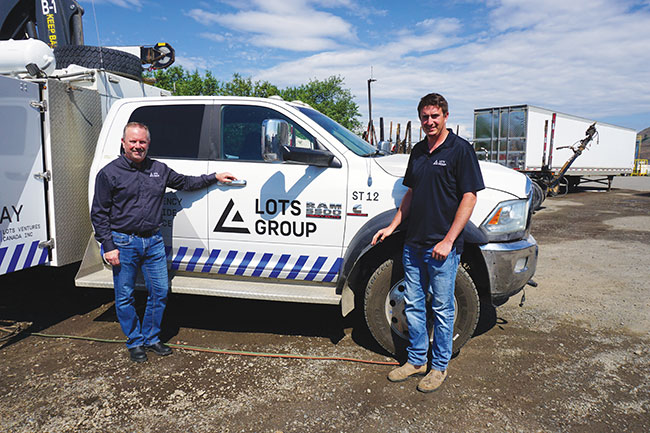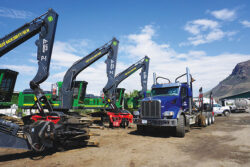
Features
Harvesting
Logging Profiles
LOTS Group: Lots of success
LOTS Group Canada started as a family venture with its roots in Kamloops, B.C.
February 15, 2024 By Jennifer Ellson
 LOTS Group Canada started as a family venture with its roots in Kamloops, B.C. Photos: Annex Business Media.
LOTS Group Canada started as a family venture with its roots in Kamloops, B.C. Photos: Annex Business Media. Nestled in the vibrant city of Kamloops, British Columbia, LOTS Group Canada emerges as a beacon of success within the Canadian forest industry. Originating as a humble local venture, it has evolved into a key player within an international integrated transport company, revolutionizing the provision of state-of-the-art transport solutions for the forest and other industries.
Inception to ascension
LOTS Group Canada’s modest beginnings to unyielding expansion is a shining example of a thriving forest industry enterprise. Originally known as C. Munden Transport Ltd., the company started in 1967 as a log hauling operation and expanded into third-party commercial vehicle maintenance, inspection and repair services. Under Greg Munden and his wife Kim’s leadership, the business continued the growth that started under Greg’s parents, Jim and Linda, as Munden Ventures. Fast forward to 2021, Munden Ventures and its forestry arm, Peak Forestry, co-owned with his brother Chad and wife, were acquired by Sweden’s LOTS Group, propelling them into a trajectory of relentless growth. From being the owner and managing director, Greg now serves as strategic advisor for the Canadian operations.
“LOTS Group has enjoyed rapid growth in line with the goals of the Swedish-based organization entering Canada,” Greg tells CFI while showing the massive fleet scattered at its lot in the sunny south-central part of B.C. last summer.
Greg adds that despite lumber market challenges, LOTS maintained and bolstered its forestry operations, increasing annual production through steadfast partnerships with core mill customers in B.C.’s Interior.

LOTS Group Canada’s trucking fleet surged from 14 to 52 dedicated logging trucks since its acquisition in 2021.
Expanding fleet, NEW horizons
The trucking fleet surged from 14 to 52 dedicated logging trucks, plus additional subcontractors, spanning the B.C. Interior, and in Port Alberni and Campbell River on Vancouver Island. Growth stemmed from strategic acquisitions and organic expansion, responding to heightened volume demands from existing customers.
Greg’s son Nolan is director of assets and services – a role that suits him since he has a mechanic red-seal license. LOTS employs 25 mechanics for its customers and to maintain the company’s 52 truck and trailer units hauling both long and short logs, as well as harvesting powerhouse machines comprising two John Deere 953M bunchers, a John Deere 848 and a 948 skidder, three John Deere 2154 processors with Waratah heads, two John Deere 2656G hoe chucker and road builders, a John Deere 2654G loader, a Hitachi 260 log loader, a John Deere 850J dozer, and a Hyundai R140 excavator.
Simultaneously, LOTS expanded its commercial repair and parts business. The Kamloops shop grew, and a new facility in Port Alberni opened, mirroring the model of maintaining a hauling fleet while offering parts through a dedicated CBS distributor parts store. LOTS provides repair, inspection, and preventative maintenance services to third-party customers.
LOTS has also modernized its digital operations, expanding use of tools such as telematics and JD Link. Greg reflects on the transformative impact of managing the business through data, saying that daily monitoring of Key Performance Indicators (KPIs) is a game-changer. This approach, uncommon in the industry, replaces the previous energy-intensive process of gathering data. Now, the team working out of the state-of-the-art control towers can swiftly review KPIs from the previous day and take immediate action, ensuring that any areas in the red today are set to be in the green tomorrow, making everyone accountable to deliver action plans.

The company has modernized its digital operations, expanding its use of tools such as telematics and JD Link. The team works out of a state-of-the-art control towers.
Hiring and retention prowess
In tandem with its operational expansion, LOTS witnessed a workforce surge, growing from 50 to 110 employees. This growth, amid industry-wide recruitment and retention challenges, underscores the company’s resilience and ability to attract and retain a skilled team during a transformative period.
“We consider ourselves fortunate to assemble an exceptional team, especially in an industry marked by challenging recruitment and retention,” Greg says.
To attract top talents, the company prioritizes innovation in their hiring approach, customizing perks such as flexible shift patterns in shop operations to align with employees’ schedules.
“We have to adjust the mind-set and adjust cycle times. We’re working with customers to think differently, like exploring the use of reload yards to more effectively manage the length of day required for drivers,” Greg explains. Additionally, LOTS offers competitive compensation and benefits exceeding industry standards.
Last year, Greg’s team launched LOTS Driving Academy, a comprehensive training program that welcomed eight new drivers, including two females. This initiative aligns seamlessly with LOTS’ commitment to fostering diversity and inclusion.
Future vision
Trish Kohorst, director of transportation and harvesting activities, outlines LOTS’ strategy to draw in new drivers for the forest industry, including targeting recent high school graduates considering a trucking career, and individuals contemplating a career change. LOTS has had success in upskilling professional drivers working in other areas of trucking, but want to join the elite class of professional log haulers. Greg’s visionary outlook hints at transformative shifts: with an awareness of changing workforce preferences, the prospect of truck sharing emerges as a dynamic solution. In an era where lengthy shifts are less appealing, the company’s commitment to adaptability shines through.
“These days, workers are no longer interested in 14-hour shifts, so again we have to adjust our mindset,” Greg muses.
Print this page